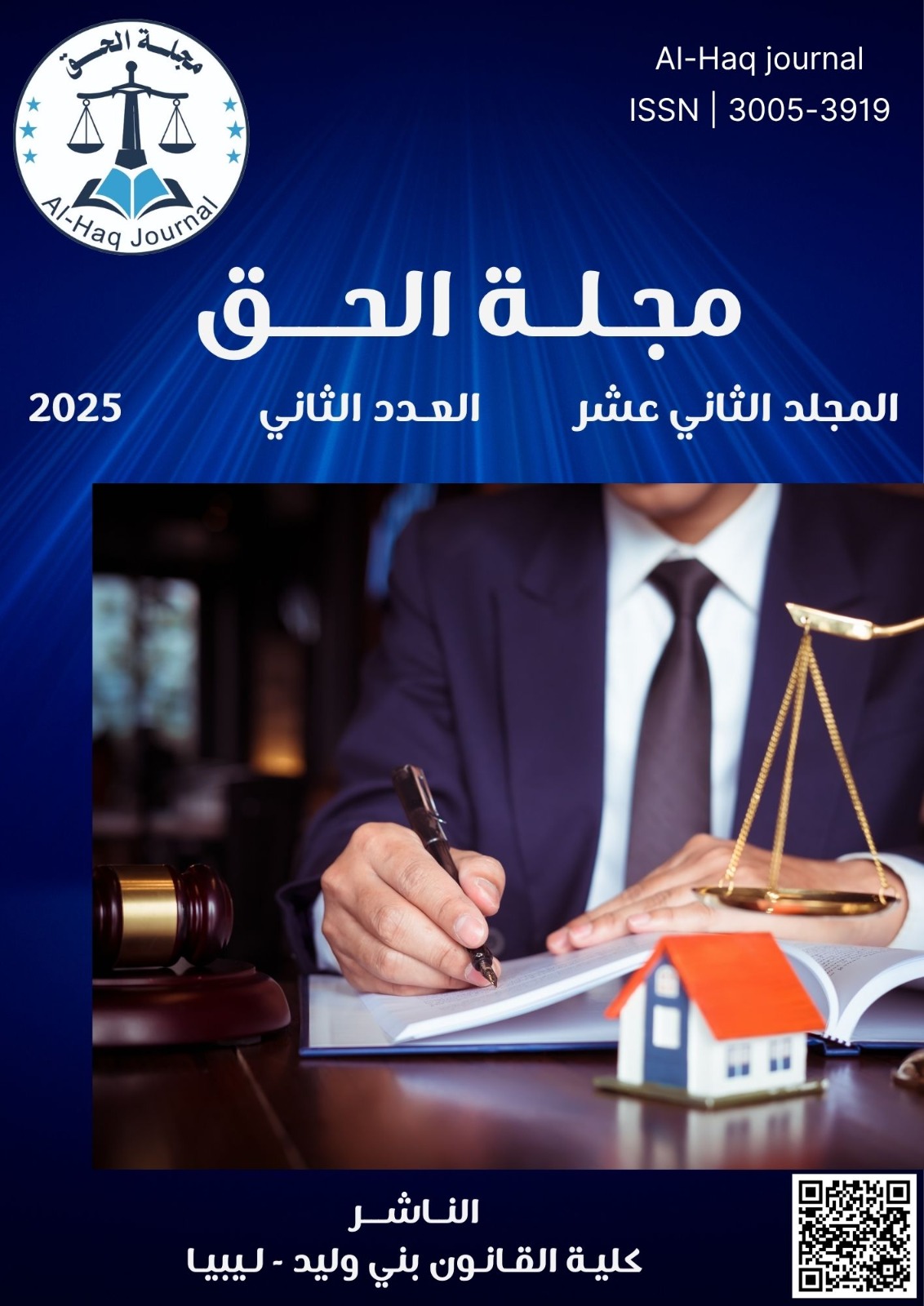Istishab and its impact on modern medical liability
DOI:
https://doi.org/10.58916/alhaq.v12i2.338الكلمات المفتاحية:
Istishab، medical liability، certainty، doubt، developmentالملخص
This study examines the principle of Istishab, one of the disputed evidentiary sources in the science of Usul al-Fiqh (Islamic legal theory), and its application to the field of modern medical liability, in light of the principles and objectives of Islamic law (Sharia). It outlines the concept of Istishab, its types, the conditions for its validity as legal evidence, and the scholarly debate surrounding its probative authority.
The research also explores the foundations of medical liability in the context of contemporary scientific and technological developments, which have led to new forms of accountability requiring renewed jurisprudential reasoning.
A central focus is placed on the role of Istishab in proving medical error, particularly in cases where direct evidence of fault or a causal link between the medical act and the harm is difficult to establish. The analysis draws upon legal maxims such as “the presumption is that a prior state continues to exist” and “freedom from liability is the original state.” It also considers the use of Istishab in assessing the civil liability of physicians and the legitimate guarantees for potential harm, through contemporary applied examples.
The study concludes that Istishab is a valid inferential method in the absence of conclusive evidence and may, when its conditions are met, support the patient’s claim in ambiguous cases. It recommends a controlled application of Istishab in medical adjudication to balance the protection of patients’ rights with fairness toward physicians, and calls for further applied jurisprudential studies to address emerging challenges in modern healthcare.
التنزيلات
المراجع
- أصول الفقه الإسلامي، وهبة الزحيلي, دار الفكر, دمشق سوريا, ط:1-1986.
- أصول الفقه الإسلامي، محمد عبد القادر أبو فارس, جامعة القدس المفتوحة, عمان الاردن,2011.
- الأشباه والنظائر، ابن نجيم الحنفي, دار الكتب العلمية, بيروت لبنان,ط:1- 1999.
- الأشباه والنظائر، جلال الدين السيوطي, المكتبة الوقفية, القاهرة مصر.
- الإبهاج في شرح المنهاج , للسبكي, دار الكتب العلمية, بيروت لبنان, ط:1-1984.
- الإحكام في أصول الاحكام , لابن حزم الظاهري, تحق: احمد محمد شاكر, دارالافاق الجديدة, بيروت لبنان.
- الإحكام في أصول الأحكام ,محمد بن علي الآمدي, تحق: عبدالرزاق عفيفي, دار الصميعي, الرياض السعودية,ط:1-1988.
- ارشاد الفحول إلى تحقيق علم الاصول، محمد بن علي الشوكاني, مكتبة صبيح, القاهرة مصر,دط, دت.
- إعلام الموقعين عن رب العالمين، ابن قيم الجوزية، تحق: طه عبدالرؤوف سعد، دار الجيل، بيروت، لبنان، 1973م.
- الإفتاء المصرية، فتوى رقم 300 لسنة 2001م.
- أصول السرخسي, لابي بكر السرخسي, تحق: ابو الوفا الافغاني, لجنة إحياء المعارف النعمانية, حيدر آباد الهند.
- البحر المحيط في أصول الفقه, بدر الدين للزركشي, منشورات وزارة الاوقاف والشؤون الاسلامية الكويتية.
- البرهان في أصول الفقه, لأبي المعالي الجويني, نحق: عبدالعظيم الديب,ط:1, الدوحة قطر.
- بدائع الصنائع في ترتيب الشرائع، أبوبكر الكاساني, دار الكتب العلمية, بيروت لبنان,ط:2- 1986.
- تاج العروس من جواهر القاموس. مرتضى الزبيدي, تحق: لجنة من المختصين, دار الارشاد والانباء بالكويت, ط:2001.
- تقرير القواعد وتحرير الفوائد، ابن رجب الحنبلي, مكتبة المؤيد، الرياض السعودية.
- العدة في أصول الفقه, لأبي يعلى الحنبلي, نحق: أحمد بن علي المباركي, ط 1990.
- الرضا في العمليات الطبية، . محمد عبد الغفار الشريف، المجلة العربية للفقه والقانون، العدد 10.
- روضة الناظر وجنة المناظر في أصول الفقه, لابن قدامة المقدسي, شركة إثراء المتون العلمية, الرياض السعودية, ط:9- 2020.
- ركن الخطأ في المسؤولية المدنية، محمد حسين الشامي، أطروحة دكتوراه غير منشورة، جامعة عين شمس. القاهرة، مصر.
- سنن أبوداود, ابو داوود السسجتاني, دار الحديث , القاهرة مصر.
- سنن الترمذي, محمد بن عيس الترمذي, المكتبة الوقفية, القاهرة نصر.
- شرح تنقيح الفصول في اختصار المحصول ، شهاب الدين القرافي, دار الفكر,بيروت لبنان, 2004.
- شرح الورقات في أصول الفقه، جلال الدين المحلي, تحق: حسام الدين بن موسى, منشورات جامعة القدس , فلسطين, ط:1-1999.
- شرح العضد على مختصر المنتهى الاصولي, ابن الحاجب المالكي, دار الكتب العلمية, بيروت لبنان, ط:1-2000.
- شرح الكوكب المنير(في أصول الفقه) لابن النجار الفتوحي الحنبلي, نشر وزارة الاوقاف السعودية, ط:1993.
- شرح مختصر الروضة ( البلبل في أصول الفقه) نجم الدين الطوفي الحنبلي, تحق: محمد بن طارق, منشورات اسفار لنشر الكتب العلمية, الكويت, ط:1- 2020.
- شرح صحيح البخاري، ابن بطال القرطبي، مكتبة الرشد، د ط ، د ت .
- صحيح البخاري, محمد اسماعيل البخاري, دار الحديث, القاهرة مصر
- الفروق، لشهاب الدين القرافي، تحق: محمد حجي، دار الغرب، بيروت1994م.
- الفقه الإسلامي وأدلته، د وهبة الزحيلي، دار الفكر, دمشق سوريا, ط:2-1985.
- قواطع الأدلة في الاصول , لابي مظفر السمعاني الحنفي, دار الفكر , بيروت لبنان, ط:1-1997.
- كشف الأسرار عن أصول البرذوي, علاء الدين البخاري, دار الكتب العلمية , بيروت لبنان, دط, ت.
- المدخل لدراسة الشريعة الإسلامية، عبد الكريم زيدان، مؤسسة الرسالة .
- مجمع الفقه الإسلامي الدولي، قرار رقم 23 (11/3) بشأن التداوي بالمحرمات، جدة، 1986م
- مجمع الفقه الإسلامي الدولي، قرار رقم 26 (1/4) بشأن زراعة الأعضاء، الكويت، 1988م
- مجمع الفقه الإسلامي الدولي، قرار رقم 67 (5-7) بشأن التداوي بالمحرمات،1992م
- مجمع الفقه الإسلامي الدولي، قرارات وتوصيات المجمع، الدورة السابعة عشر، الرياض السعودية.
- مجلة الأحكام العدلية، طبعت ببيروت لبنان, المطبعة الادبية, 1302هـ .
- المغني على مختصر الخرقي، لابن قدامة المقدسي، تحق: محمد شرف الدين وآخرون، دار الحديث، القاهرة مصر، ط:1-1996م.
- مغني المحتاج, للخطيب الشربيني, دار المعرفة, بيروت لبنان.
- مصادر الحق في الفقه الإسلامي، عبدالرزاق السنهوري، مكتبة النهضة المصرية، د ط، د ت.
- المسؤولية المدنية والجنائية في الشريعة الإسلامية، محمود شلتوت، طبعة الأزهر، د ط، د ت.
- مسؤولية الطبيب المدنية، دراسة مقارنة، عبدالسلام التونجي، دار المعارف، بيروت، لبنان، 1967م.
- مسؤولية الطبيب بين الفقه والقانون، حسان شمس باشا، محمد علي البار، دار القلم، دمشق، سوريا، ط:1- 2004م.
- مسؤولية الطبيب الجنائية الإسلامية، أسامة إبراهيم، رسالة ماجستير في القضاء الشرعي، الجامعة الأردنية، كلية الدراسات العليا كانون الأول، 1994م.
- المسؤولية الطبية في الشريعة الإسلامية والقانون الوضعي، محمد الألفي، دار الجامعة الجديدة.
- المسؤولية التقصيرية بين الشريعة والقانون، محمد فوزي فيض الله، أطروحة دكتوراه بكلية الشريعة بالأزهر، القاهرة، مصر، 1962م.
- المنثور في القواعد الفقهية، الزركشي، تحقيق: طه عبد الرؤوف سعد، دار الكتب العلمية، بيروت لبنان.
- الضرورات الطبية وأثرها في التخفيف الفقهي، محمد المختار الشنقيطي، دار ابن الجوزي، 1426هـ.
- الضمان في الفقه الإسلامي، علي الخفيف، دار الفكر العربي، القاهرة، مصر، 2000م.
- الضمان في الفقه الإسلامي، عبد الله التركي، مكتبة العبيكان, الرياض السعودية.
- الضوابط الشرعية للإذن الطبي، المجلة الفقهية الكويتية، محمد عبد الغفار الشريف، العدد 14.
- نظرية الالتزام بالتعويض عن الضرر، فؤاد معلال, مطبعة الامنية, الرباط المغرب,ط:4- 2012.
- نظرية الضمان أو أحكام المسؤولية المدنية والجنائية في الفقه الإسلامي، وهبة الزحيلي، دار الفكر، دمشق، سوريا، ط:2 – 1982م .
- الطب النبوي، ابن قيم الجوزية، مكتبة الثقافة الدينية، بور سعيد، مصر، ط:1– 2001م،
- المبسوط ، شمس الدين السرخسي، دار الكتب العلمية، بيروت، لبنان، د ط ، 1993م.
- الموافقات في أصول الفقه, لابي اسحاق الشاطبي, دار الكتب العلمية, بيروت لبنان, ط:1- 2004.
- المحصول في علم الاصول, فخر الدين الرازي, دار الكتب العلمية, بيروت لبنان, ط:1- 1988.
- المغني على مختصر الخرقي، لابن قدامة المقدسي، تحق: محمد شرف الدين وآخرون، دار الحديث، القاهرة مصر، ط:1-1996م.
- مختار الصحاح، لابي بكر الرازي, منشورات دار عمار, عمان الاردن,ط:1- 1996.
- المستصفى من علم الأصول، لابي حامد الغزالي, مطبعة بابي الحلبي, القاهرة مصر, لا ط, لات.
- المصباح المنير في غريب الشرح الكبير, احمد الفيومي, تحق: عبدالعظيم الشناوي, دار المعارف , القاهرة مصرط:2.
-. نظام مزاولة المهن الصحية السعودية، الصادر بالمرسوم الملكي رقم(م- 59) بتاريخ 4-11-1426 هـ , الاصدار الثالث 1440.
- نيل الأوطار من اسرار منتقى الاخبار، محمد بن علي الشوكاني دار الحديث، القاهرة ., مصر.
- الوسيط في القانون المدني، عبدالرزاق السنهوري، دار إحياء التراث العربي بيروت، لبنان، د ط، د ت.













